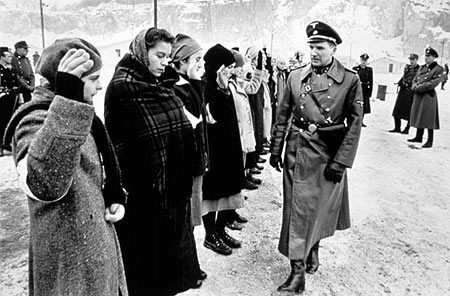“Schindler’s List” is a historical drama film directed by Steven Spielberg. It was released to mass critical praise and is one of Spielberg’s most celebrated movies. I chose this film to review as it is a harrowing, yet immersive journey unlike many others before and after it.
The film takes on the backdrop of the Jewish ghettos and concentration camps of Nazi Germany where many ethnic and religious enemies of the Nazi regime (Particularly Jews) suffer under constant, violent oppression. It is in these areas where we are introduced to Oskar Schindler, a businessman and member of the Nazi party. He befriends Itzhak Stern, a Jewish officer with many connections in the ghettos, and together they start a business making various items for the armed forces. Throughout the film we see Schindler develop as a character as we see his morals and views change. He initially hires Jewish workers because they’re cheap labour and cost a lot less than Poles or Germans. Schindler’s workforce is deemed “essential” which therefore saves them from the merciless slaughter of concentration camps. He has no moral obligation to help them initially and simply hires them for good business. Schindler even gets defensive when his factory is referred to as a “safe haven”. However, after seeing the relentless massacring of the Jews, he slowly begins to realise the true evils of the Nazis.
As I previously mentioned the film is held in very high regard by critics and the general public alike, so it’s not surprising that the film does have a very broad appeal, especially to individuals interested in Modern history, especially World War II, the Nazi regime and the events of the holocaust. The distressing imagery and subject matter will almost definitely turn off some viewers and the film should by no means be watched by anyone too young, however this imagery is integral to the story, tone and overall message of the film and although the film would be much easier to watch without its more intense content, it would lose much of its emotional impact.
“For if we ever forget the tragedies of the past, it’s safe to assume that we are doomed to repeat them.”
As a film, Schindler’s List exists to show us the horrors of oppression and the true extent of man’s inhumanity and cruelty to his fellow man in times of struggle and conflict. We see many barbaric examples of abuse and murder of men, women and even young children. However, as the film progresses it begins to push forward another, more uplifting, hopeful message, that even in the darkest of hours, and in the bleakest, darkest times, that there will always be good willed people in the world in places you wouldn’t expect. The message is obviously brought across from Oskar Schindler’s character development, as he slowly realises the cruelty of the Nazi’s and, eventually, willingly saves millions of Jews from their fates at camps such as Dachau and Auschwitz.
Overall, Schindler’s List is a stunning yet difficult to watch movie. But more than that, it is a culturally important movie as well. The terrifying events of the holocaust should never be ones that are forgotten, and I believe this movie plays an important role in not only showing the disturbing level of barbarity in the events of the holocaust, but it also plays an important role in preserving history for future generations to come. For if we ever forget the tragedies of the past, it’s safe to assume that we are doomed to repeat them.



You must be logged in to post a comment.